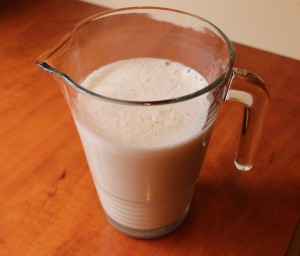Category Archives: Tips & Tricks
Almond Milk vs. Rice & Soy Milk
Almond milk is one of the most nutritious milk substitutes available!
 If you have a blender at home, I recommend you start making your own almond milk, it only takes 15 minutes, and it is SO MUCH better than drinking processed milk! You only need two ingredients, Organic Almonds and Water! It is also low in calories and fat!
If you have a blender at home, I recommend you start making your own almond milk, it only takes 15 minutes, and it is SO MUCH better than drinking processed milk! You only need two ingredients, Organic Almonds and Water! It is also low in calories and fat!
Almond milk is great for people who are allergic to Soy because it contains no soy, also for those who are lactose intolerant because it contains no lactose.
Almond milk doesn’t contain casein, a milk protein that’s chemically similar to gluten, almond milk is appropriate for those who suffer from gluten allergies. Isn’t that great!
However, both rice and soy milk are good milk alternatives for those who have milk allergies or are lactose intolerant, but you should buy manufactured rice and soy milk to insure that they’re properly fortified with the vitamins and minerals you need. Because almonds are naturally very nutritious, almond milk doesn’t need to be fortified.
Almond milk is richer in vitamins and minerals than soy or rice milk and it’s also a healthier choice than cow’s milk.
Almonds are rich in nutrients including fiber, vitamin E, magnesium, selenium, manganese, zinc, potassium, iron, phosphorus, tryptophan, copper and calcium. Almond milk does not have as much protein and calcium as cow’s milk and other animal milk substance
Nutritional Values in 1 Cup of Raw Unsweetened Almond Milk
| Calories | 40 | Sodium | 180 mg |
| Total Fat | 4 g | Potassium | 180 mg |
| Saturated | 0 g | Total Carbs | 1 g |
| Polyunsaturated | 0 g | Dietary Fiber | 0 g |
| Monounsaturated | 0 g | Sugars | 0 g |
| Trans | 0 g | Protein | 1 g |
| Cholesterol | 0 mg | ||
| Vitamin A | 10% | Calcium | 45% |
| Vitamin C | 0% | Iron | 4% |
*Percent Daily Values are based on a 2000 calorie diet. Your daily values may be higher or lower depending on your calorie needs.
The Magical Vegetable KALE!
 This is Sarah Annabelle my granddaughter and she just loves smoothie’s with kale, filled with Antioxidants / Nutrition / Vitamins and Minerals
This is Sarah Annabelle my granddaughter and she just loves smoothie’s with kale, filled with Antioxidants / Nutrition / Vitamins and Minerals
Healthy, healthy, healthy
Kale is low in calorie, high in fiber and has zero fat. One cup of kale has only 36 calories, 5 grams of fiber and 0 grams of fat. It is great for aiding in digestion and elimination.
Kale is high in iron. Per calorie, kale has MORE IRON than beef.
Kale is filled with powerful antioxidants. Antioxidants, such as carotenoids and flavonoids help protect against various cancers.
Kale is a great anti-inflammatory food. One cup of kale is filled with 10% of the RDA of omega-3 fatty acids, which help, fight against arthritis, asthma and autoimmune disorders.
Kale is great for cardiovascular support. Eating more kale can help lower cholesterol levels.
Kale is high in Vitamin C. This is very helpful for your immune system, your metabolism and your hydration. Important as the winter months roll in.
Kale is high in calcium. Per calorie, kale has more calcium than milk, which aids in preventing bone loss, preventing osteoporosis and maintaining a healthy metabolism.
